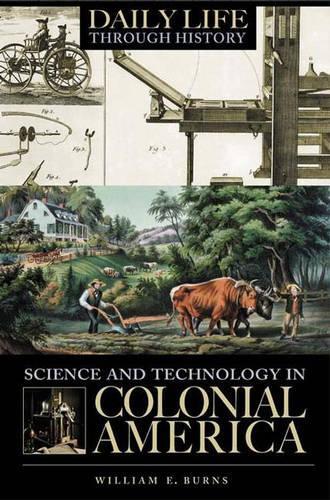
Science and Technology in Colonial America
(Hardback)
Publishing Details
Science and Technology in Colonial America
By (Author) William E. Burns
Bloomsbury Publishing PLC
Greenwood Press
30th September 2005
United States
Classifications
General
Non Fiction
Impact of science and technology on society
303.4830973
Physical Properties
Hardback
224
Description
Science and technology are central to history of the United States, and this is true of the Colonial period as well. Although considered by Europeans as a backwater, the people living in the American colonies had advanced notions of agriculture, surveying, architecture, and other technologies. In areas of natural philosophywhat we call sciencesuch figures as Benjamin Franklin were admired and respected in the scientific capitals of Europe. This book covers all aspects of how science and technology impacted the everyday life of Americans of all classes and cultures. Science and Technology in Everyday Life in Colonial America covers a wide range of topics that will interest students of American history and the history of science and technology: * Domestic technologyhow colonial women devised new strategies for day-to-day survival * Agriculturalhow Native Americans and African slaves influenced the development of a American system of agriculture * Warhow the frequent battles during the colonial period changed how industry made consumer goods This volume includes myriad examples of the impact science and technology had on the lives of individual who lived in the New World.
Reviews
Beginning with a chronology, Burns introduces innovations from what was called natural philosophy in the 17th and 18th centuries. Providing social historical context on life in the American colonies, he discusses advances in such endeavors as farming, manufacturing, food preservation, warfare, printing, and mapping. The author points out how these differed from practices in settlers' homelands, and Native American influences on some developments. Illustrations include Benjamin Franklin's drawings on electricity and fireplace ventilation. References include useful Web sites. * Art Book News Annual *
[T]his and the whole series of Daily Life books make a useful addition to school and college libraries that can afford them. * Catholic Library World *
This book fills an important niche by linking history with practical science. This work uses early American life to establish a context in which the new academic science of America and Europe could develop. The book provides an ideal base for interdisciplinary courses and is a trove of authentic examples for teachers or for student research. * The Science Teacher *
[F]ollows the early peoples of America and how domestic technology, agriculture and conflicts changed their lives. Chapters trace the evolution and roots of these technologies in new discoveries and provide fine links between scientific developments and human activities. * MBR Bookwatch *
Author Bio
William E. Burns has taught at the University of Pennsylvania, the University of Maryland, and Mary Washington College. His earlier books include An Age of Wonders: Prodigies in Later Stuart Politics and Culture (2002) and Witch Hunts in Europe and America: An Encyclopedia (Greenwood, 2003).
